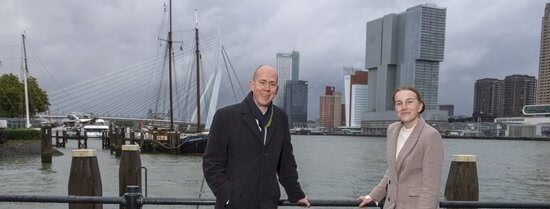Erasmus University Rotterdam brings scientific insights close to society. You can read how Erasmus School of Social and Behavioural Sciences (ESSB) does this in Spark. This discussion between Melanie Ouwendijk (21) and Willem de Koster (37) gives you a taster. Melanie is a second-year student of Pedagogical Sciences and Willem is Professor of General Sociology, in particular Cultural Sociology. They met to discuss their background, disciplinary field and ambitions.
Melanie: “I relocated from Ede to Rotterdam for this study. I really feel at home here. The city’s diversity is also reflected in my year group, and that’s something I really appreciate. These valuable contacts have opened up my world. Interactive learning was another reason for me to choose EUR. I find discussions with fellow students really instructive alongside lectures, and this helps me internalise the teaching material. As member of the degree programme committee, I also want to contribute to improving our education. I think it’s important that we educate our future pedagogues in the best way possible.”
Willem: “It’s fantastic that you take the time for this, Melanie! Student feedback is simply vital. I also think it’s great that you made a conscious choice for ESSB’s interactive learning. It’s an important form of education and, as university, we had good reasons for choosing this. But it is, of course, only really of value if our students recognise that too. Was studying pedagogy something you’d always wanted to do?”
Melanie smiled: “Not really, no. I ended up choosing pedagogy via a roundabout route and actually started Pedagogical and Educational Sciences via higher professional education. I gradually discovered that I think it’s really important that my future work involves contact with people.”
Willem: “It was a bit of a search for me at that time too. I was strong in beta sciences and visited many open days and orientation days, including technical study programmes. But I ended up choosing Sociology. I really found it interesting how people view societal issues. And that’s not changed. I still like discovering what motivates people and why they hold certain opinions.”
Melanie: “I think that’s something we share. What do you think is important in teaching students?
Willem:: “I think it’s really important that every child gets the help they need. I became really aware of that when I did some voluntary work during my holidays. I worked for an organisation that offers holidays for one-parent families, and I heard such distressing stories from some children... I found that really hard. Because your childhood is such a decisive factor for your future! That’s something you really understand if you’ve not had an easy childhood yourself... I think my most important motivation as future pedagogue is love. Love for my fellow man.”
Melanie: “I think it’s really important that every child gets the help they need. I became really aware of that when I did some voluntary work during my holidays. I worked for an organisation that offers holidays for one-parent families, and I heard such distressing stories from some children... I found that really hard. Because your childhood is such a decisive factor for your future! That’s something you really understand if you’ve not had an easy childhood yourself... I think my most important motivation as future pedagogue is love. Love for my fellow man.”
Willem: “That's a great motivation! And it’s really special to hear how you want to contribute to a better world. That’s really in line with what ESSB stands for. Thank you for meeting with me!”
Melanie: “Thank you too. Enjoy your work!”
Willem: “And good luck with your pedagogy study programme and with the work you’ll be doing in the future!”
- Professor

